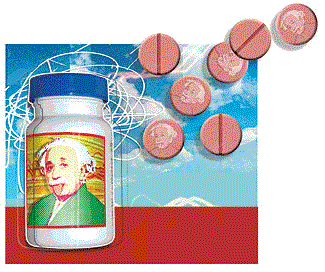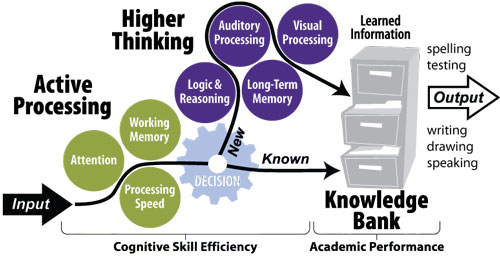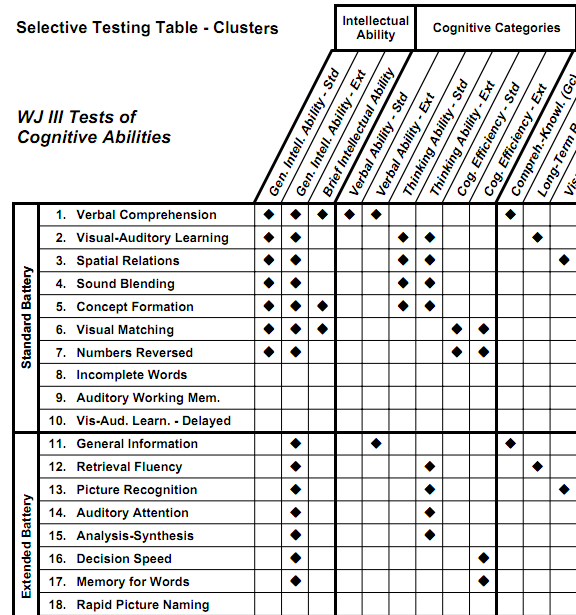Improve Problem Solving Under Pressure
 Interesting new research from Carnegie Mellon University demonstrates that chronically stressed individuals get better at problem solving if they take a few minutes to think about what is important to them. This self-affirmation technique can involve something as simple as taking a few minutes to identify an important value (family, art, business, friends. etc.) and writing a couple of sentences on what makes it important.
Interesting new research from Carnegie Mellon University demonstrates that chronically stressed individuals get better at problem solving if they take a few minutes to think about what is important to them. This self-affirmation technique can involve something as simple as taking a few minutes to identify an important value (family, art, business, friends. etc.) and writing a couple of sentences on what makes it important.
Focusing on what is important mitigates the effects of stress on parts of your brain and immediately improves your ability to solve problems. There is some evidence that this works outside the laboratory:
“An emerging set of published studies suggest that a brief self-affirmation activity at the beginning of a school term can boost academic grade-point averages in underperforming kids at the end of the semester.
A simple technique for improving cognitive performance under pressure in yourself and others. I am interested to hear from readers that have built self-affirmation into everyday activities.
Source of image: Pressure Cooker
Categories: College Student, Problem Solving Tags:
20 Hours of Mobile Gaming Enhances Cognition
 A new study found that playing video games for an hour a day, five days per week, for a month produced significant improvements in a player’s ability to track multiple objects and complete visual search tasks. That is just 20 hours of using games that are a lot of fun.
A new study found that playing video games for an hour a day, five days per week, for a month produced significant improvements in a player’s ability to track multiple objects and complete visual search tasks. That is just 20 hours of using games that are a lot of fun.
Researchers looked at the effects of action games and non-action games. The games in the study included: Modern Combat Sandstorms. The Sims3, Bejeweled 2, Memory Matrix and Hidden Expedition Everest.
There are two important aspects of this study for readers of the Next Brain Blog:
- Gaming improves specific cognitive skills on small screens and works in the wild. Participants used their iPhones and did the training outside the laboratory in a real world setting.
- Non-action games, for example Sims3 and Memory Matrix showed some evidence of improving cognitive skills. While this is a preliminary result, it is important for those that don’t like violent games.
I am interested to hear how readers are using their mobile phones to play games or use other apps to improve brain function and cognitive performance.
Categories: College Student, Memory and Learning, Perception Tags: games
Good Grades are Mostly Determined by Self-Control
 I am often asked by parents what type of skills are critical for success in school. They hear about special programs or techniques for reading, note taking or math skills and want to know if they work. That is why I am always on the lookout for scientific research that probes how the mind’s of high-performing students work.
I am often asked by parents what type of skills are critical for success in school. They hear about special programs or techniques for reading, note taking or math skills and want to know if they work. That is why I am always on the lookout for scientific research that probes how the mind’s of high-performing students work.
For example, recent research on nearly 700 German eighth graders suggests that a student’s level of self-control is the number one factor that determines success. It is more important than memory, general intelligence, verbal ability, mental speed, numerical ability and even creativity. The researchers claim:
“The data show that the most important factor in getting good school grades was the student’s score on psychological tests of self-control. Cognitive ability was the next best predictor of grades, but in fact, it was not a very strong one.”
While not a surprise to readers of the Next Brain Blog, this is an important finding. Delaying gratification, managing procrastination and the ability to structure and manage time are the capacities that students need for success.
I am interested to hear from readers with insights into how to be an effective student. What learning and testing taking skills are critical and how can we develop them?
Categories: Child, Cognitive Development, College Student, IQ and EQ, Memory and Learning, Training Tags:
Gift Giving Idea: Consider Fat Brain Toys
 Fat Brain offers an amazing collection of high quality toys and entertainments designed to stimulate the brain and develop cognition. You can shop for toys by gender and ages ranging from 1 year old to 18 years old. From magnetic poetry and brain food (colorful goo) to the best selling stomp rockets and reflections (image shown), a truly unique game that combines mirrors, visual illusion and competition.
Fat Brain offers an amazing collection of high quality toys and entertainments designed to stimulate the brain and develop cognition. You can shop for toys by gender and ages ranging from 1 year old to 18 years old. From magnetic poetry and brain food (colorful goo) to the best selling stomp rockets and reflections (image shown), a truly unique game that combines mirrors, visual illusion and competition.
Just the kind of toys that should be on the holiday shopping list of Next Brain Blog readers. Interested to hear from anyone that has purchased or plays with Fat Brain Toys. How are they making you smarter?
Categories: Child, Cognitive Development, College Student, Mental Focus, Other, Perception, Problem Solving Tags: toys
Walnuts Boost Critical Thinking Skills By 11%
 Researchers at Andrews University have found a potential connection between eating walnuts and improved critical reasoning skills in young adults. They published their findings in the British Journal of Nutrition. The bottom line:
Researchers at Andrews University have found a potential connection between eating walnuts and improved critical reasoning skills in young adults. They published their findings in the British Journal of Nutrition. The bottom line:
“Students consuming walnuts showed a significant improvement in inference after consuming one-half cup of walnuts daily for eight weeks,” says Pribis. “Walnuts will obviously not make you a critical thinker; this comes after years of studying. However, students and young professionals in fields that involve a great deal of critical thinking or decision-making could benefit from regularly eating walnuts.”
Significant improvement in this case means scoring 11% higher on a verbal inferential reasoning task. Walnuts were ground up and consumed by having two sliced of banana bread every day.
We have reported on additional claims that walnuts provide a cognitive boost elsewhere on the Next Brain blog
I am interested to hear from readers that use walnuts to improve brain function or cognitive performance. How many do you eat and how often? How do you consume them – raw or as an ingredient in some other food?
Categories: Cognitive Decline, College Student, Diet, Problem Solving Tags:
Do ADHD Meds Make Healthy People Smarter?
Many of the emails I get about building a Next Brain have to do with drugs, especially medication prescribed for attention deficit hyperactivity disorder or ADHD. Readers want to know if there is evidence to support the claim that people without ADHD that still use drugs like Adderall will experience improved brain function and enhanced cognitive performance.
Important note: Using medications outside of the boundaries of their prescription or using medications without a prescription can be unsafe and illegal.
 The 2011 September issue of the Psychological Bulletin has taken this question up with articles on who takes so-called smart pills and what kind of effects they are having. My favorite paper,
The 2011 September issue of the Psychological Bulletin has taken this question up with articles on who takes so-called smart pills and what kind of effects they are having. My favorite paper,
reviews results from over 40 studies finds:
“The cognitive effects of stimulants on normal healthy people cannot yet be characterized definitively, despite the volume of research that has been carried out on these issues. Published evidence suggests that declarative memory can be improved by stimulants, with some evidence consistent with enhanced consolidation of memories. Effects on the executive functions of working memory and cognitive control are less reliable but have been found for at least some individuals on some tasks.”
In short there is some evidence for improved learning by memorizing (simple list of items) but doubt about significant improvement on working memory (how much information you can attend to at one) or self control.
More research is in the works but early results signal that the smart pill in its current form is not a silver bullet for the Next Brain.
Categories: College Student, Executive Function, Mental Focus Tags: smart drugs
LearningRx – A Brain Training Center Near You
A reader shared an experience they had with LearningRx a consumer center for brain training. They promise to improve your academic performance by providing coached training on a full range of cognitive skills (see diagram).
The process starts with a formal assessment using the Woodcock-Johnson assessment for cognitive abilities (partially shown below).
You are then matched with a coach and work 3-5 days per week for an hour a day for 3 months. They claim a 3.6 year improvement on the cognitive assessment and have some studies to back it up.
LearningRx has centers across the US and they want to open more using a franchise approach. Interested to hear from other readers that have used this service.
Categories: Child, Cognitive Development, College Student, Memory and Learning, Mental Focus, Perception, Training Tags: brain training
Make Scene Analysis Decisions up to 25% Faster
 On the Next Brain blog we explore specific techniques for improving brain function and cognitive performance. The best techniques are easy or pleasurable, have a significant impact and are backed by scientific evidence. Take for example, the new study on how video games impact the brain’s ability to process probabilistic information conducted at the University of Rochester.
On the Next Brain blog we explore specific techniques for improving brain function and cognitive performance. The best techniques are easy or pleasurable, have a significant impact and are backed by scientific evidence. Take for example, the new study on how video games impact the brain’s ability to process probabilistic information conducted at the University of Rochester.
Researchers found that playing action video games for as little as 50 hours increased decision speed up to 25% with no loss in accuracy.
The tasks involved analyzing a scene (sometimes shown visually other times just described verbally) and deciding what is going on. Subjects were 18-25 years old and do not normally play video games.
Why does this work? According to the researchers:
“Decisions are never black and white,” she said. “The brain is always computing probabilities. As you drive, for instance, you may see a movement on your right, estimate whether you are on a collision course, and based on that probability make a binary decision: brake or don’t brake.”
Action video game players’ brains are more efficient collectors of visual and auditory information, and therefore arrive at the necessary threshold of information they need to make a decision much faster than non gamers, the researchers found.
This suggest using action video games to train your brain should create lasting and transferable effects.
Categories: College Student, Decision Making Tags: games
Simple Study Skills That Light Up Your Brain!
 A colleague shared an interesting New York Times article, Forget What You Know about Good Study Habits. The core idea:
A colleague shared an interesting New York Times article, Forget What You Know about Good Study Habits. The core idea:
“In recent years, cognitive scientists have shown that a few simple techniques can reliably improve what matters most: how much a student learns from studying. The findings can help anyone, from a fourth grader doing long division to a retiree taking on a new language. But they directly contradict much of the common wisdom about good study habits, and they have not caught on.”
The few simple techniques uncovered by cognitive scientist for improving how we study include:
1. Regularly change or alternate the room or environment you study in.
2. Study or work related but not identical topics or study tasks in one sitting. For example, when learning a language study vocabulary, written translation and speaking all in the same session.
3. Space study sessions out over time rather than cramming. Alternate study with simple physical activities.
4. Prepare and take mock tests yourself before taking actual tests.
Simple yes but not commonly practiced by students or adult learners engaged in systematic study. Yet they are proven to “light up the brain” or improve our learning performance.
Interested to hear from readers about other study techniques they have found effective.
Categories: Child, College Student, Memory and Learning, Older Adult, Training Tags: study skills
Use Off Prescription Drugs to Enhance Cognition?
 Drugs designed for Alzheimer’s disease, ADHD, narcolepsy and other neurological disorders are finding new off-prescription use as cognitive enhancers. Students, professionals and many other citizen have reported using prescription-only drugs such as Aderaal (a form of ritlan for ADHD) and Modafinil (a stimulant used to treate narcolepsy) to boost mental performance. Typical non-medical uses of these “smart drugs” include efforts to improve concentration, enhance memory and create mental energy.
Drugs designed for Alzheimer’s disease, ADHD, narcolepsy and other neurological disorders are finding new off-prescription use as cognitive enhancers. Students, professionals and many other citizen have reported using prescription-only drugs such as Aderaal (a form of ritlan for ADHD) and Modafinil (a stimulant used to treate narcolepsy) to boost mental performance. Typical non-medical uses of these “smart drugs” include efforts to improve concentration, enhance memory and create mental energy.
Using smart drugs without a prescription is illegal but they are easily available on the internet and from street sources. As reported in the commentary, Toward responsible use of cognitive-enhancing drugs by the healthy, in the prestigious scientific journal Nature:
“Today, on university campuses around the world, students are striking deals to buy and sell prescription drugs such as Adderall and Ritalin — not to get high, but to get higher grades, to provide an edge over their fellow students or to increase in some measurable way their capacity for learning.”
And it is not just students but professors, physicians, lawyers, engineers and many other professionals.
Not surprising there is little or no scientific evidence that these drugs work to enhance cognitive performance of healthy people. However, the subjective effect of increased mental energy seems unmistakable.
With many people experimenting with smart drugs, and a growing number of calls for studying their use to achieve peak cognitive performance, they will be a frequent topic in the Next Brain Blog.
Please leave a comment if you have experience in using smart drugs that you want to share with other readers.
Source: Image of Smart Drugs
Categories: College Student, Lifestyle, Memory and Learning, Mental Focus, Professional Tags: mental energy, smart drugs



